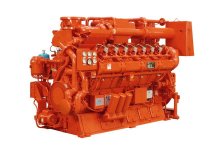Seems this discussion has taken two paths. I took the original post as more of a theoretical question and that's how I addressed it. The other path appears to be more of a comparison between typ commercially available engines which in my opinion are not apples to apples comparison, equals.
There are in the past and today examples of large industrial gas (spark ignition) engines that can and do stand toe to toe with diesel engines. Here is an example (see pic) of what is available today. Low speed, 1400-1800 rpm designed to run 24/7. Over in Salt Lake City they try and manage the lakes level by pumping water in/out. There are three I believe, gas powered engines driving pumps, large ones, ones that pump 450,000 gpm, yes per min. Think this project would use gas powered engines if reliability/dependability were not up to the task? With some applications, fuel availability dictates engine design, compression Vs spark, not reliability/durability considerations.
I have no problem if you take the path of comparing engine types if you want to compare what's available down at your local car/tractor dealer but the original question said all else being equal. I think the GE Waukesha engine is an example of a gas engine that is equal.
